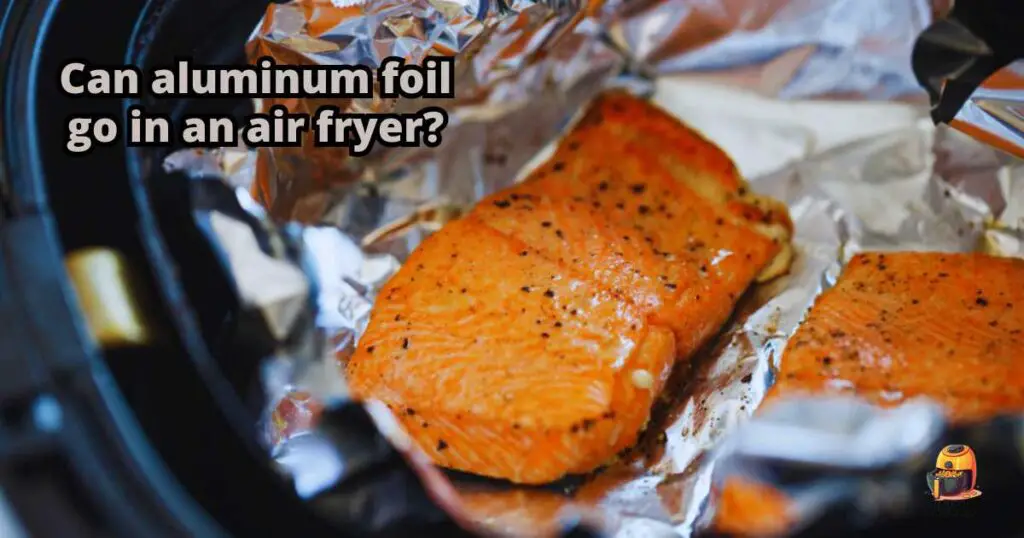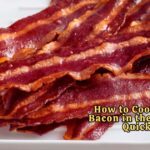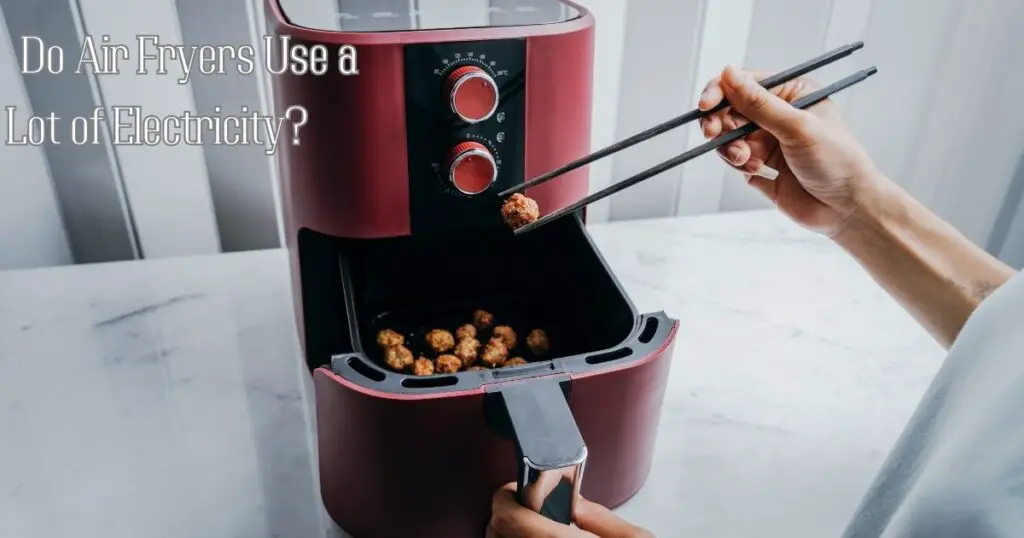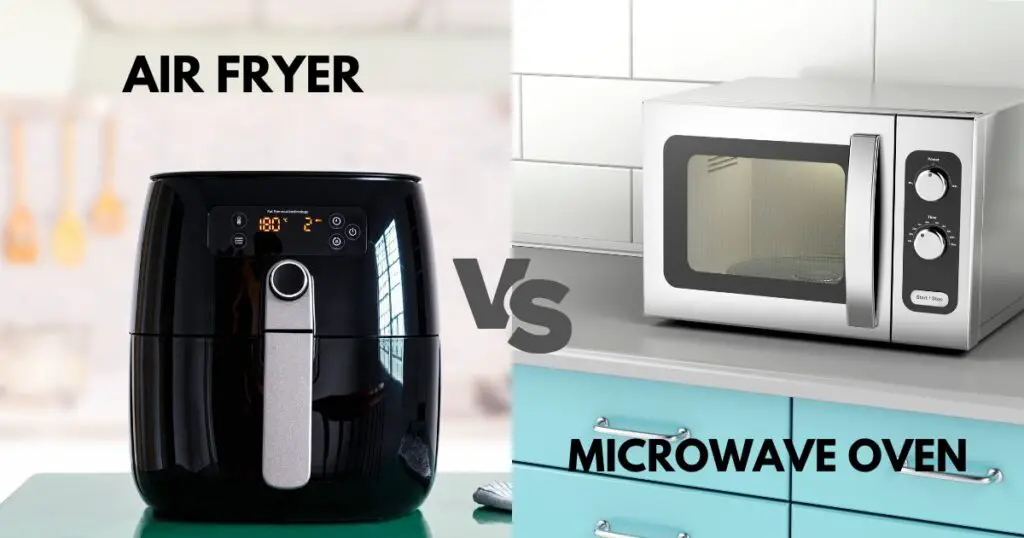Table Of Contents
Yes, you can use aluminum foil in an air fryer with some considerations. It’s useful for wrapping delicate or small items to prevent them from being moved by the air circulation. However, avoid covering the entire basket with foil, as it can disrupt air circulation and affect cooking efficiency.
Make sure any foil-wrapped food has small vents to allow hot air circulation. Be cautious with acidic or liquid-heavy dishes, as they may interact with the foil. Always consult your air fryer’s user manual for specific guidance on foil use to ensure safe and effective cooking.

How to Use Aluminum Foil in the Air Fryer
Using aluminum foil in an air fryer can be a helpful technique for specific cooking tasks. Here’s how to use it properly:
1. Prepare the Foil
Start by selecting a piece of aluminum foil appropriate for your cooking task. Ensure it’s large enough to accommodate the food you plan to cook or protect.
2. Shaping the Foil
Depending on your intended use, shape the foil accordingly. You have several options:
- Foil Pouch: Create a pouch by folding the foil in half and sealing the sides, leaving one side open for food insertion.
- Basket Liner: Line the air fryer basket with foil to prevent sticking and make cleanup easier.
- Foil Cover: Cover the top of your food with foil to shield it from direct heat or prevent excessive browning.
3. Ventilation
When wrapping food in foil, it’s crucial to pierce or vent the foil. Use a fork or knife to make small holes or slits in the foil. This allows hot air to circulate inside the foil pouch and around the food, ensuring even cooking.
4. Placing in the Air Fryer
Carefully place the foil-wrapped or foil-covered food in the air fryer basket. Ensure it’s positioned in a way that doesn’t obstruct the air vents or disrupt the airflow within the appliance.
5. Adjust Settings
Set the air fryer’s cooking temperature and time according to your recipe’s instructions. Ensure that the settings are appropriate for the specific dish you’re preparing.
6. Monitoring the Cooking Process
Keep a close watch on the cooking progress, especially if it’s your first time using foil in the air fryer. Ensure the foil doesn’t touch the air fryer’s heating elements or obstruct the fan, as this can affect cooking efficiency.
7. Safety Precautions
Be cautious when using foil with acidic or liquid-heavy dishes. Direct contact between foil and acidic ingredients can result in a reaction that affects the taste or safety of the food. It’s advisable to use a non-reactive liner between the foil and the food if needed.
8. Cleaning Up
After cooking, carefully remove the foil-wrapped or foil-covered food from the air fryer. Dispose of the used foil properly. Clean the air fryer basket and tray as required, as some drips or residue may accumulate.
For specific advice on using aluminum foil in your air fryer, consult your appliance’s manual, as guidelines may vary by model. While aluminum foil can assist with cooking delicate items, preventing sticking, and capturing drips, it’s essential to use it thoughtfully and in moderation to avoid disrupting the cooking process.
Read More:
- Can You Put Parchment Paper in an Air Fryer
- Can I Use Stainless Steel in Air Fryer?
- Can Glass Go in Air Fryer?
Why Use Foil in an Air Fryer?
Using foil in an air fryer can be a practical choice for several reasons:
Non-Stick Surface
Foil creates a non-stick surface, making it particularly useful when cooking items that are prone to sticking to the air fryer basket or tray. This prevents food from tearing apart or leaving a mess behind.
Easy Cleanup
Foil liners simplify cleanup by trapping grease, food residue, and drips. Once cooking is complete, you can dispose of the foil and any trapped debris. This helps maintain the cleanliness of your air fryer, reducing the need for extensive scrubbing.
Precise Browning Control
Foil can act as a shield to prevent over-browning or excessive crisping on the top of dishes. This is especially beneficial when you want to achieve precise texture control, such as preventing a dish from becoming overly crispy or charred.
Cooking Delicate Items
Foil provides a stable and secure cooking environment for delicate or small items. It prevents them from being blown around by the air circulation, ensuring even cooking and preventing potential damage to delicate ingredients.
Drip Management
Placing foil underneath food serves as a drip catcher. It prevents drips and food particles from falling into the air fryer’s heating element or bottom, reducing smoke and the risk of hard-to-clean residues.
Enhanced Flavor and Moisture Retention
Foil pouches are perfect for cooking items with liquids or sauces. They contain the moisture and flavors, resulting in tastier and juicier dishes.
Customized Cooking Environments
Foil can be easily shaped and folded to create custom cooking environments within the air fryer. For example, you can use foil to make dividers or barriers, allowing you to cook multiple items with distinct requirements simultaneously.
Appliance Protection
When used correctly, foil can protect the air fryer’s components, such as the basket and tray, from stubborn residues and potential damage. This helps prolong the lifespan of your appliance.
However, it’s important to use foil judiciously and follow safety guidelines to avoid interfering with the air fryer’s performance or safety. Always consult your air fryer’s manual for specific recommendations regarding the use of foil, as these may vary by brand and model.
Precaution of Use Aluminum Foil in an Air Fryer
Using aluminum foil in an air fryer can be helpful, but taking precautions is important to ensure safe and effective cooking. Here are some precautions to keep in mind:
Avoid Full Coverage
Never cover the entire air fryer basket or tray with foil. Using foil to cover the entire cooking surface can obstruct airflow, preventing hot air from reaching the food and compromising the cooking process. It’s best to use foil selectively to shield or line specific areas.
Pierce or Vent Foil
When wrapping food in foil, ensure you create small holes or vents in the foil. This is crucial for allowing hot air to circulate inside the foil pouch, ensuring that the food cooks evenly. Without proper ventilation, the food might end up steaming rather than air frying.
Mind Acidic Ingredients
Be cautious when using foil with acidic ingredients like tomatoes, citrus fruits, or vinegar-based marinades. Direct contact between foil and acidity can result in a chemical reaction, affecting the taste and safety of the food. Consider using a non-reactive liner between the foil and the food to prevent contact.
Regular Monitoring
Keep a close watch on the cooking process, especially if it’s your first time using foil in your air fryer. Ensure that the foil doesn’t come into contact with the air fryer’s heating elements, such as the heating coil or fan, as this can impact cooking efficiency and even pose a safety hazard.
Consult the User Manual
Always refer to your air fryer’s user manual for specific guidelines and recommendations regarding the use of aluminum foil. Different air fryer models may have varying instructions and safety precautions.
Use Foil Sparingly
While aluminum foil can be a valuable tool in an air fryer, it should be used judiciously. Reserve its use for situations where it genuinely enhances your cooking experience, such as preventing sticking, managing drips, or creating customized cooking environments.
Prioritize Safety
Safety should always be a top priority when using foil or other cooking accessories. If you have any doubts or concerns about using foil in your air fryer, consider alternative cooking methods or reach out to the manufacturer or customer support for guidance.
By following these precautions, you can use aluminum foil effectively in your air fryer while ensuring safe and delicious results. Always use foil thoughtfully and in moderation to avoid interfering with the air fryer’s performance or safety.
When to Use Aluminum Foil in the Air Fryer
Aluminum foil can be used in the air fryer in various situations to enhance your cooking experience. Here are some common scenarios when using aluminum foil can be beneficial:
Preventing Sticking
When cooking items that tend to stick to the air fryer basket or tray, such as delicate fish fillets, breaded foods, or items with cheese, lining the basket with foil can prevent sticking and simplify cleanup.
Creating Foil Packets
Foil can be used to create foil packets or pouches to cook foods with liquids or sauces. This method helps trap steam and flavors, resulting in juicier and more flavorful dishes. Foil packets are commonly used for items like vegetables, seafood, or chicken with marinades.
Shielding from Direct Heat
If you want to prevent the top of certain dishes from over-browning or becoming too crispy, such as casseroles or lasagnas, you can cover them with foil during part of the cooking process. This helps shield the food from direct heat.
Managing Drips
Placing foil underneath food, especially when cooking greasy items like bacon or sausages, can catch drips and prevent them from falling onto the air fryer’s heating element. This reduces smoke and minimizes mess.
Customizing Cooking Environments
Foil can be shaped and folded to create customized cooking environments within the air fryer. For instance, you can use foil to create dividers or barriers to cook multiple items with distinct requirements simultaneously.
Creating Crusts or Shields
Foil can be used to mold shields or collars around items like pie crusts or the edges of a casserole to prevent them from overcooking or burning.
Managing Moisture
Foil can help control moisture levels when cooking certain foods. For instance, when reheating pizza or other items with toppings that may become soggy, placing foil under the food can maintain crispness.
When Not to Use Aluminum Foil in the Air Fryer
While aluminum foil can be a useful tool in the air fryer, there are situations when it’s best to avoid using it:
- Do not cover the entire air fryer basket or tray with aluminum foil. This can obstruct airflow and disrupt the cooking process, resulting in unevenly cooked food. Foil should be used selectively.
- When wrapping food in foil, ensure you pierce or vent the foil to allow hot air circulation. Foil without proper ventilation can lead to steaming rather than air frying, affecting the texture and quality of the dish.
- Avoid direct contact between aluminum foil and acidic ingredients like tomatoes, citrus fruits, or vinegar-based marinades. The interaction between foil and acidity can cause a chemical reaction that affects taste and safety. Consider using a non-reactive liner between the foil and the food in such cases.
- Using foil excessively or unnecessarily can hinder the air fryer’s performance and the cooking process. Reserve foil for situations where it genuinely enhances your cooking experience, such as preventing sticking or managing drips.
- Ensure that foil does not come into contact with the air fryer’s heating elements, such as the heating coil or fan. This can disrupt the appliance’s operation and pose a safety hazard.
- Avoid using foil with foods that benefit from direct air circulation for crispiness, such as french fries or breaded items. Using foil in these cases can result in less crispy and less evenly cooked food.
- Be cautious when using aluminum foil at very high temperatures in the air fryer. Extremely high temperatures may cause the foil to melt or burn, potentially releasing harmful fumes.
- Always refer to your air fryer’s user manual for specific recommendations and guidelines regarding the use of aluminum foil. Different air fryer models may have varying instructions.
Aluminum Foil Vs Parchment Paper Vs Wax Paper
Here’s a comparison of aluminum foil, parchment paper, and wax paper in table form:
| Property | Aluminum Foil | Parchment Paper | Wax Paper |
| Heat Resistance | High | Moderate to High | Low |
| Non-Stick Surface | Yes | Yes | No (may stick) |
| Heat Conductivity | High | Low | Low |
| Moisture Resistance | High | Moderate | Low |
| Oven Safe | Yes (up to 450°F) | Yes (up to 450°F) | No |
| Freezer Safe | Yes | Yes | Yes |
| Microwave Safe | No (causes sparks) | Yes | No |
| Versatility | Can be used for a wide range of cooking and grilling applications. | Ideal for baking, roasting, and cooking foods in the oven. | Suitable for wrapping cold or room temperature items, but not for cooking or baking. |
FAQs
Can You Put Parchment Paper in the Air Fryer?
Yes, you can put parchment paper in the air fryer. It is a safe and convenient option for lining the air fryer basket, preventing sticking, and making cleanup easier. Just be sure to trim the parchment paper to fit and avoid blocking airflow.
Can I Wrap Chicken in Foil in an Air Fryer?
Yes, you can wrap the chicken in aluminum foil in an air fryer. This method effectively retains moisture and flavor while preventing sticking to the air fryer basket. However, it’s important to ensure vents or openings in the foil to allow proper hot air circulation, ensuring even cooking and a crispy exterior.
Is Using Aluminum Foil in an Air Fryer Safe?
Yes, using aluminum foil in an air fryer is safe. However, it should be used thoughtfully, with proper ventilation, and without covering the entire cooking surface to avoid obstructing airflow. Always follow your air fryer’s guidelines and manufacturer’s recommendations for safe usage.
Final Verdict
Air fryers are super handy kitchen gadgets. They make fried treats crispy with very little oil. The cool thing is you can use foil and parchment paper in them. Just remember, if it’s safe for a regular oven, it’s suitable for an air fryer.
But here’s a big tip: don’t cover the hot parts like the heating thing or fan with foil or anything else. That can stop your food from cooking and break your air fryer. So, use foil and parchment paper, but keep the hot stuff open for tasty results every time!
You May Also Like to Read:







